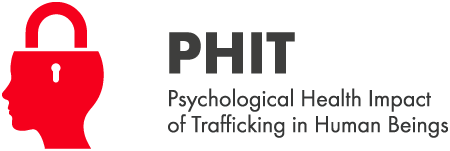PHIT Project Intermediate conference took place on June 27th and 28th at Tilburg, Netherlands.
On the first day, partners gathered to participate to an Open Day on the Psychological Health Impact of THB providing an update of existing knowledge from a multidisciplinary perspective and presenting the first results of the project analyses.
On the 28th, the project team discussed the implementation of the project activities during a fruitful Consortium meeting at the University of Tilburg. The agenda was focused on the upcoming publication of the project main results in September, and on the final dissemination strategy to be developed to guarantee a long-lasting impact of the project at the European level.
First final results of the PHIT Project will be issued from September onwards. Extracts and information on the project deliverables will be published in this page: http://www.phit.ub.edu/en/results/
The psychological impact of THB and its consequences on therapies and police investigation
Mar Ramos (Hospital Vall d’Hebron, Barcelona) and Rina Ghafoerkhan (Equator Foundation, Amsterdam) opened the conference providing an update on the existing knowledge of the mental health consequences of THB. They both highlighted the necessity to provide an adequate mental health diagnosis to human trafficking victims to better determine their therapy needs and help their recovery in time: often overly diagnosed with Post Traumatic Stress Disorder, most survivors show symptoms of greater functional impairments and suffer from Complex PTSD.
From a law enforcement perspective, both Xavier Cortés (Inspector, Catalan Police) and Mirjam ter Beek (Psychologist, Dutch Police) stressed the central importance of the victim’s statement during the police investigation and during the judicial process although trauma, stress, and shock have a great influence on the accuracy of the statement (Mirjam ter Beek). That is why, it is essential that police take into account the psychological state of the woman and know how to contextualize this testimony to better interpret the statement and to extract all the valuable information and data provided by the victim.
Preliminary results of PHIT Project
Psychologist Alba Afageme (University of Barcelona) presented the first results extracted from the interviews with THB survivors carried out in Spain to understand and contextualize the experience of THB and its consequences through the Life History Calendar method. This study mainly shows that most interviewed women show signs of emotional vulnerability before being trafficked: 80% lived parental conflict, 72% declare having suffered violence between the age of 4 and 12 and 70% have lived a traumatic event between the age of 12 and 20.
The analysis of administrative files on residence permit request carried out by Markus González (University of Barcelona) showed that only 18% of the files include a psychological report whereas there is a reference to the psychological impact of THB (anxiety, insomnia, sadness…) in 82% of them. However mentioning the psychological condition of the woman does not appear as a relevant factor for the issue of the residence permit.
Teresa Rodríguez Montañés (University of Alcalá) analysed the criminal proceedings related to THB cases in Spain: she noted that although there is an increasing awareness of PHIT among the judiciary, judges are still quite reluctant to take it into account to understand changes in the victim’s testimony.
At last, Leyla Khadraoui (INTERVICT, University of Tilburg) presented the preliminary results of the analyses of interviews with stakeholders carried out in the Netherlands: she highlighted the lack of guidelines and best practices for stakeholders, often leading to secondary victimization of THB survivors especially during the criminal proceeding.
The Mental Health Evaluation of Human Trafficking Victims – Mar Ramos Gascon, Psychiatrist at the Transcultural Psychiatry Department, Vall d’Hebron Hospital
Understanding the psychological needs of victims of sexual exploitation – Rina Ghafoerkhan, Equator Foundation
Dilemmas and priorities in working with victims of human trafficking from an assistance perspective – Rob Kelder, Fier
Preliminary results of PHIT Project – University of Barcelona – Markus González Beilfuss, Alba Alfageme Casanova, Teresa Rodríguez
Preliminary results of PHIT Project – University of Tilburg – Leyla Khadraoui, Conny Rijken
Presentation of pilot of the Violent Offenses Compensation Fund and the plausibility of victimhood of human trafficking victims – Roland Knobbout, Dutch Violent Offenses Compensation Fund

